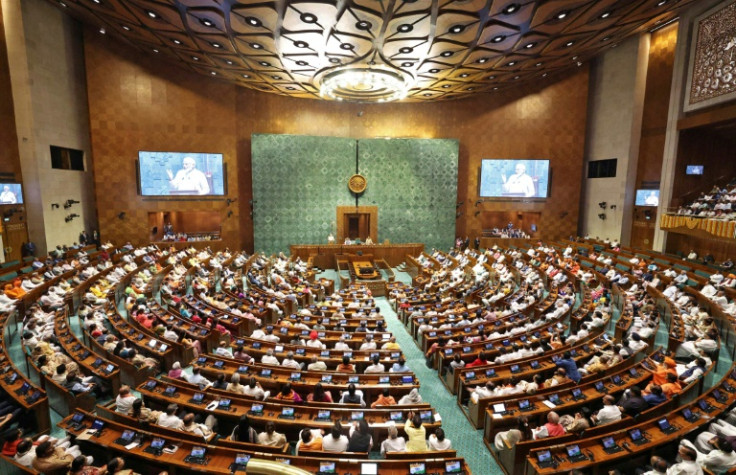
In what is being called an unprecedented attack on democracy, the Indian government suspended as many as 142 opposition lawmakers for protesting a security breach in parliament.
Last week, the Indian parliament came under attack after at least two men intruded into the chamber and sprayed coloured gas while shouting slogans in the Lok Sabha, India's lower house of parliament.
The intruders were reportedly angry over a lack of job opportunities. All of them were arrested soon after the incident.
The lawmakers were suspended for disrupting the proceedings of the parliament after they held protests demanding a statement from Union Home Minister Amit Shah on the serious security breach.
At least 141 opposition MPs were suspended after demanding answers to the Parliament security breach. Some of them mimicked the Vice President while sitting out. pic.twitter.com/1aeAqzeD6h
— Brut India (@BrutIndia) December 19, 2023
The MPs have been calling for the prime minister, Narendra Modi, and the home minister to address the issue in the House; however, the government has refused to discuss the matter.
Instead of addressing the biggest-ever security breach since the deadly militant attack on India's parliament in 2001, the BJP government resorted to muffling the voices of the lawmakers.
49 more MPs suspended from Lok Sabha, total reaches 141. What mockery of democracy. https://t.co/itPQSTNMon
— Dhanya Rajendran (@dhanyarajendran) December 19, 2023
Most of the suspended MPs from 11 different opposition parties will remain suspended until the winter session ends on Friday.
The opposition MPs have compared the government's handling of the situation to that of the North Korean Assembly, claiming that the ruling Bharatiya Janata Party (BJP) government wants to scare the opposition parties.
On Monday, as many as 79 opposition MPs were suspended in a single day, followed by 49 suspensions on Tuesday.
Meanwhile, Lok Sabha Speaker Om Birla has said that the matter comes under the purview of the secretariat and that he will not let the central government intervene in the matter.
"The government cannot intervene in (responsibilities of) Lok Sabha secretariat. We will not allow that either," he said last week.
In an interview with an Indian publication, Prime Minister Modi termed the security breach a "very serious" matter but added that there was no need for a debate on the matter in parliament.
According to a report in The Guardian, almost two-thirds of those suspended are part of a coalition that has vowed to oust the BJP government in the 2024 general elections.
"Unfortunately, we have to start writing obituaries for parliamentary democracy in India," said Shashi Tharoor, an Opposition MP who has also been suspended.
The big picture:
The Modi government has often been accused of suppressing all forms of dissent in the country. The opposition lawmakers claim that the government is intolerant of any kind of criticism.
Earlier this year, a report by Rest of World, a technology publication, said that Twitter removed posts related to a BBC documentary on Indian Prime Minister Narendra Modi at the government's request.
Modi is a member of an umbrella group, the Rashtriya Swayamsevak Sangh (RSS), which propagates an ideology of Hindutva, or Hindu-ness, which asserts India is a Hindu nation.
India slid from 140th in the World Press Freedom Index to 150th position after Modi became prime minister of India in 2014. The government, however, has rejected the findings of the index prepared by the non-profit Reporters Without Borders.
Despite the criticism and controversies, Modi enjoys high approval ratings and is expected to run for re-election next year.
Critics have also accused the Modi government of being intolerant. In 2016, members of the United States Congress wrote to Prime Minister Modi about the increasing religious intolerance in the country. They urged Modi to address "increasing intolerance and violence experienced by members of [India's] religious minority community."
The letter also mentioned the beef bans in several Indian states, stating that this was "increasing tensions and encouraging vigilante violence against the Indian Muslim community."
Human rights activists, journalists, and academicians believe that the situation in India has only worsened, and public disapproval has not dissuaded the right-wing government from continuing to do whatever it feels is right.







